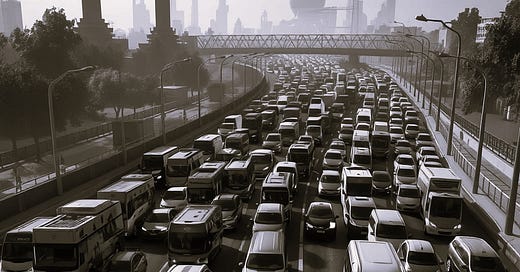The Jevons Paradox: Why Our Obsession with Efficiency Fuels Climate Change
The Troubling Feedback Loop
In 1865, English economist William Stanley Jevons observed a surprising trend: Improvements in coal efficiency instead of decreasing coal use, actually led industries to consume even more. Economists call this conundrum the Jevons paradox.
Think about your smartphone or laptop-they are marvels of efficiency compared to gadgets of even a decade ago Yet, collectively, we consume vastly more energy precisely because these efficient technologies are everywhere, driving our collective energy consumption higher, not lower.
This paradox isn’t just historical trivia—it impacts today’s energy debates. Despite improved efficiency, the world in 2024 used more energy than ever. According to the International Energy Agency (IEA), global energy demand jumped 2.2%, nearly doubling the average growth of the past decade. The same year marked a troubling milestone: temperatures reached 1.55°C above pre-industrial levels, making 2024 officially the warmest year on record.
So, what's driving this relentless appetite for energy?
First, rising temperatures boost demand for air conditioning, especially in countries like China and India, creating a vicious cycle: higher temperatures mean more air conditioners, often powered by fossil fuels, leading to even more climate-warming emissions. But it's not just the heat to blame. Our insatiable appetite for data-driven by AI, social media, and streaming—combined with the surge in electric sales (with EVs now representing 1 in 5 new cars), has sent electricity use rocketing by 4.3%, twice the rate of previous years.
To meet the demand, countries used more coal and natural gas, but also added a record amount of renewable energy, like solar and wind, alongside steady growth in nuclear energy. The good news is that renewables and nuclear together covered 80% of new electricity demand, making oil's share dip below 30% for the first time in half a century.
Still, our best efforts fell short. Energy-related carbon emissions continued to rise, by 0.8% ((37.8 billion tonnes). Clearly, efficiency alone isn't solving our emissions challenge—it might even be part of the problem.
Why Efficiency Isn't Always Efficient
Striving for efficiencies is normal in business operations. It seems intuitive - greater efficiency cuts costs saves time, and boosts productivity. Indeed, the fossil fuel industry consistently advocates efficiency to lower operational costs and environmental footprints. The International Energy Agency (IEA) further emphasises that energy efficiency progress is crucial for the transition away from fossil fuels, and projects it could account for more than 70% of the expected drop in oil demand by 2030.
But here's where Jevons' insight resurfaces. The savings from efficiency often make services cheaper, leading us to consume more, not less. In the 1980s, economists Daniel Khazzoom and Leonard Brookes revisited this phenomenon— specifically for energy consumption. They argued that attempts to reduce energy consumption through increased efficiency would simply raise the demand for energy throughout the economy. This became known as the Khazzoom–Brookes postulate.
Research published in Nature Communications indicates this trend will likely intensify as the planet warms further. By mid-century, energy demands could spike by over 25% in tropical regions and parts of the U.S., Europe, and China These increases won’t be evenly distributed—many low-income nations will struggle disproportionately with surging demand, amplifying global inequality.
The relationship between climate change and energy consumption creates what has been described as a "troubling feedback loop." Warming temperatures boost energy consumption, fuelling more fossil-fuel emissions, and accelerating climate change even further. If this additional energy comes from fossil fuel sources it further increases greenhouse gas emissions, which in turn accelerates climate change.
Breaking Out of the Paradox Loop
To overcome these paradoxes, we need resilient solutions to handle increasing energy demands, such as upgrading grids, creating more efficient buildings, and expanding renewable energy infrastructure. Economists suggest pairing efficiency with policies like carbon pricing to discourage excessive consumption. Reinvesting savings from efficiency into green infrastructure can create positive incentives rather than unintended consumption booms.
But none of this can happen without global collaboration, which in today's fragmented geopolitical landscape feels a lot like assembling IKEA furniture without the instructions—possible, but only if everyone stops about who holds the screwdriver.
As global temperatures rise and energy demand soars, understanding and addressing these paradoxes becomes increasingly urgent. The key isn't merely boosting efficiency—but transforming these vicious cycles into virtuous ones, where climate action and energy systems reinforce rather than undermine each other.
Sources:
Growth in global energy demand surged in 2024 to almost twice its recent average - News - IEA
Amplification of future energy demand growth due to climate change | Nature Communications
https://www.nytimes.com/2025/03/24/climate/extreme-heat-emissions-energy-trends.html
https://www.sciencedirect.com/science/article/abs/pii/S0921800996000778?via%3Dihub




While calling this a paradox is a useful mnemonic, it isn't a paradox. The drive for efficiency is to increase consistency and reliability. We make things more efficient, so we can rely upon it. Invention is the mother of necessity. When you enter a building, do you use the door, or the window? Unfortunately, this is reason the drive for efficiency as a solution for environmental issues is not really a solution. It is also the reason this is a socially acceptable approach. It is consistent with our standard approach to the use of natural resources since. forever. business interests have no problem adopting this non solution because being efficient is the basic approach.
Just look at the vast amount of electricity being used to power these massive data centers not to mention all the construction materials along with sterilizing the site with buildings